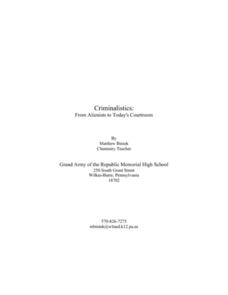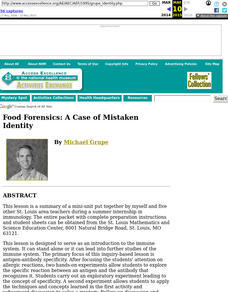Manitoba Education and Early Childhood Learning
Forensic Sciences: A Crime Scene Investigation Unit
Mr. Bergman has been murdered and we need you to solve the crime! The cross-curricular unit covers 11 different types of forensic science and includes 17 activities. Scholars perform blood type analysis, blood spatter analysis, height...
Curated OER
DNA AND BLOOD TYPING
Learners list three descriptive characteristics and three functions of DNA, describe two ways that genetics is important in a forensic investigation, and list the four major human blood types.
Center for Technology in Teaching and Learning
CSI: The Experience - Family Forensics
Forensic scientists depend on their observation skills to analyze evidence down to the molecular level. Middle and high schoolers practice making observations and predictions with a series of crime scene activities, which includes a...
Curated OER
Using Blood Tests to Identify Babies and Criminals
Young scholars solve a crime by matching a suspect's blood type to physical evidence collected at the crime scene. In this forensic science lesson plan, students identify the different blood types. They explain how blood tests work.
Curated OER
Cardiac Arrest! Using Forensics to Investigate Cardiovascular Anatomy and Function
Students identify the different parts and functions of the cardiovascular system. In this forensics lesson, students collect and analyze evidence on a fictional crime. They describe different causes of cardiac arrest.
Curated OER
Crime Scene Investigation - Biology Teaching Thesis
Students explore the different blood types, and are introduced to new knowledge through a crime scene simulated activity. They explore the genetics of blood types, and are introduced to immunology/diseases.
Curated OER
Mission Possible
Learners, in teams, solve a crime using forensic lab techniques. They apply lab techniques to a real life situation using a crime scenario that takes place on campus. Sample activities include Blood, Fiber, and Hair Lab.
Curated OER
Science: Criminalistics - A New Look at Crime
Young scholars examine the world of forensic science, focusing on fingerprint analysis. In the lesson, they implement a method by which fingerprints of class members are categorized and identified. Elementary students study...
Curated OER
Blood Business
Students identify the different kinds of blood. In this biology lesson, students investigate the antigens, agglutinins and Rh factor using their own blood. They use Punnett squares to predict blood type of offspring.
Curated OER
The Science of Forensics
Students examine the importance of details in evidence gathering, as well as the relationship between chemistry, physics and biology. In this forensics lesson students divide into groups and look at fingerprints and fill out an activity...
Curated OER
Blood, I Presume?
Students explain the value of blood in trials. In this DNA lesson students work together to collect and share information and ideas that they come up with after learning how to distinguish blood from other stains.
Curated OER
Murder Mystery
High schoolers examine how to capture foot prints while they simulate a criminal investigation. They discover how the clues are needed for identifying or eliminating murder suspects.
Curated OER
Physical Evidence
In this forensics instructional activity, students complete 14 short answer questions related to physical evidence. They explain how certain types of evidence are handled upon recovery from the crime scene.
Curated OER
Food Forensics: A Case of Mistaken Identity
Ninth graders explore the specific reaction between an antigen and the antibody that recognizes it. They carry out an exploratory experiment leading to the concept of specificity.
ConnectED
Crime Scene Investigation
How exactly does a crime scene investigation work? The resource, a unit on criminology, covers everything from the deductive reasoning skills needed for detectives to DNA fingerprinting, all the way to how to gather evidence and bring...
















